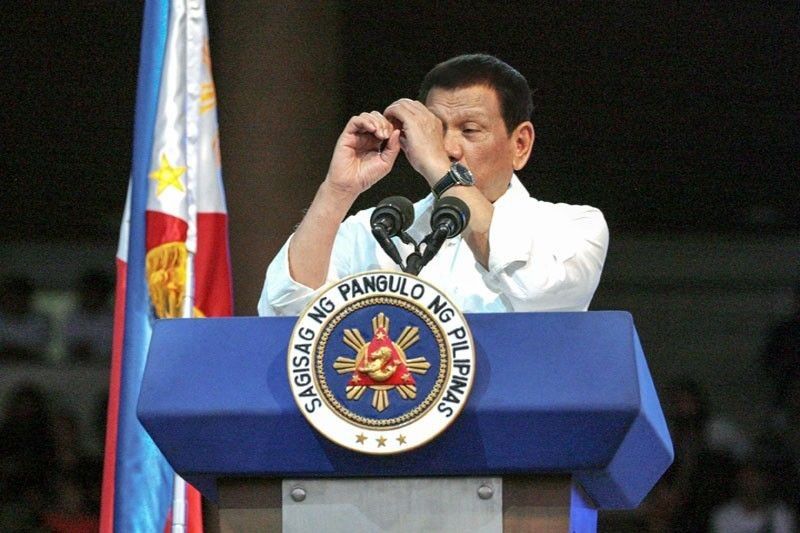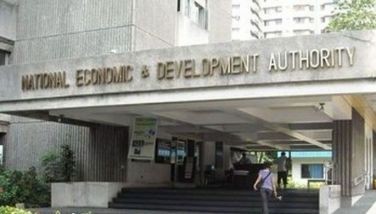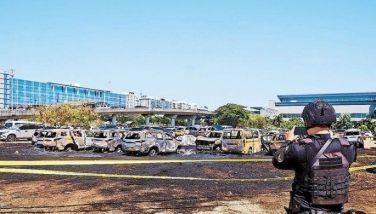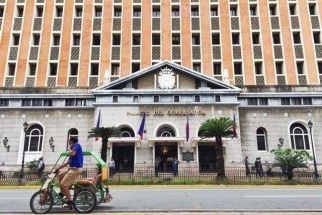Duterte’s men on the spot in Senate probes

MANILA, Philippines — This year, senator-allies of President Duterte led probes on corruption and drug scandals involving some of his trusted officials. Such moves partly contributed to the steady rise in the chamber’s public approval ratings.
At the opening of the 18th Congress last July 22, the Senate emerged with 20 members in the majority bloc, including four newbies – Christopher Go, Ronald dela Rosa, Imee Marcos and Francis Tolentino – and three returning senators, and only four lawmakers in the minority bloc or opposition.
The May 13 senatorial elections had 12 slots up for grabs, including those vacated by former senators Alan Peter Cayetano, Francis Escudero, Gregorio Honasan II, Loren Legarda and Antonio Trillanes IV.
With the exception of Cayetano, who was appointed foreign affairs chief in 2017, the senators ended their terms in office last June 30.
Escudero won as Sorsogon governor while Legarda was elected representative of the lone district of Antique and was also picked to be deputy speaker of the House of Representatives. Trillanes went on to work in academe while Honasan was appointed information and communications chief.
Reelectionist senators also waged a separate campaign as a group while still joining their respective political slates.
In the end, Sen. Cynthia Villar topped the hotly contested elections with over 25 million votes, closely followed by Sen. Grace Poe, who obtained over 22 million votes. Though ranking well in surveys prior to the polls, Go still surprised many when he placed third in the elections with over 20 million votes, overtaking other re-electionist and returning senators.
The same elections, however, saw the exit of re-electionist senator JV Ejercito, who was only over 200,000 votes shy of 12th placer Sen. Nancy Binay; and senator Paolo Benigno Aquino IV, the lone opposition candidate seeking another term. The administration juggernaut made sure that no opposition senatorial candidate won.
Investigations
One of the high-profile investigations conducted by the Senate this year was on the so-called “GCTA-for-sale” corruption scandal that led to the firing of Bureau of Corrections (BuCor) chief Nicanor Faeldon, and the uncovering of the near release from prison of convicted murderer and former mayor Antonio Sanchez. The controversy cost the head of Philippine National Police (PNP) chief Gen. Oscar Albayalde in November.
The probe was triggered by a resolution filed by Senate President Vicente Sotto III following reports in mid-August that Sanchez would be released based on the retroactive implementation of the 2013 GCTA or Good Conduct Time Allowance law.
The law, which allows the reduction of sentence by as much as 19 years based on a formula that tallies a convict’s “good behavior,” was applied to reduce Sanchez’s seven life sentences for the rape-slay of Eileen Sarmenta and the murder of her friend Allan Gomez in 1993.
Based on testimonies from inmates at the New Bilibid Prison (NBP) and BuCor officials, the GCTA law was made into a moneymaking scheme by prison officers, who received bribes from convicts in exchange for a favorable computation of their sentences.
Allegedly part of the racket was Faeldon, who supposedly received some favors from Sanchez’s family for his release.
Threatened with another detention similar to what happened to him two years ago for ignoring summons from the Senate, the former Marine officer faced the inquiry and admitted he signed Sanchez’s release papers on Aug. 20 but claimed he withdrew it just hours later.
The senators, however, were skeptical of Faeldon’s claims, citing admissions from Sanchez’s family of a deal to free him. “It seems that wherever Faeldon is assigned, corruption issues hound him,” Sen. Panfilo Lacson had remarked.
However, as the inquiry progressed, more anomalies were uncovered, including the so-called “hospital pass for sale,” which benefited mostly high-profile drug convicts; and the “tilapia” prostitution ring where women were pimped by prison officials for as high as P30,000, and again the illegal drug trade, prompting Sen. Richard Gordon, chairman of the Blue Ribbon committee, to remark that anything could be had at the NBP for a price.
Ninja cops
But the biggest surprise in the course of the GCTA hearings was the exposé on a forgotten drug raid in Pampanga on Nov. 29, 2013. Albayalde, then provincial chief, shielded from investigation 13 of his men involved in pilfering and selling over 160 kilos of shabu seized from a Chinese suspect.
It was Baguio City Mayor Benjamin Magalong who disclosed the details of what happened during the raid during a closed-door interview with senators. The “ninja cops” controversy shook the PNP and cast doubt on the administration’s war on drugs.
Magalong, as head of the PNP Criminal Investigation and Detection Group at that time, investigated the raid and concluded that Albayalde’s men pocketed the bulk of the drugs and replaced the original suspect, identified as Johnson Lee, with another Chinese national after he paid P50 million to the police officers.
The pilfered shabu with an estimated street value of P640 million was believed to have been sold with the help of drug lords at the NBP.
The Senate had also ordered the detention of Police Maj. Rodney Baloyo IV, who was Albayalde’s intelligence officer in 2013 and the one who led the questioned raid.
On Oct. 18, Gordon released a 46-page committee report on the “ninja cops” controversy and recommended that drug and graft charges be filed against Albayalde, who he said apparently led a “monumental cover-up” of the raid led by Baloyo.
He said the senators were initially skeptical of the allegations against Albayalde first raised by Magalong but as the hearings proceeded, and after being given the time to defend himself, the former PNP chief was found to be much more involved in the questioned raid than he had led investigators to believe.
He said all Albayalde could show to the committee in his defense was his recommendation to promote Baloyo and the rest, and surprisingly himself, for what he saw was a successful anti-drug raid.
The Senate also probed Health Secretary Francisco Duque III for alleged conflict of interest as some of his family-owned companies have contracts with the Department of Health, including supplying drugs, and leasing space for the Philippine Health Insurance Corp. Duque, however, stressed he had already divested his stakes in his family’s firms.
The chamber also looked into developments that pointed to increasing Chinese encroachment, including China’s funding of “Safe Philippines Project,” which will involve placing an extensive network of security cameras in Metro Manila, Metro Cebu and Davao City.
Senators blocked the P7.4-billion counterpart funding for the project in the delayed 2019 national budget, which was signed only in April. Duterte, however, vetoed the funding cut the Senate made and included it as fresh appropriations in the P4.1-trillion General Appropriations Bill (GAB) for 2020.
US ban
Last Feb. 24, opposition Sen. Leila de Lima marked her second year in what she has repeatedly described as her unjust detention by the administration based on fabricated drug charges.
She was arrested in 2017 for allegedly abetting and benefiting from the illegal drug trade at the NBP when she was still justice secretary in the Aquino administration.
“I am blessed because I am only a prisoner in the sense of being a prisoner of conscience who is being subjected to unjust physical restrictions. Yet, in every other sense of the word, I am freer than I have ever been. (T)he key to my freedom lies not in the hands of my captors. It lies in the pen I hold in my hands,” De Lima said in a statement marking her second anniversary at the PNP Custodial Center.
Her case drew much attention from the international community where she is portrayed as a prisoner of conscience. Last Dec. 20, US President Donald Trump signed the $1.4-trillion budget for 2020 that included provisions that ban Philippine government officials involved in De Lima’s “unjust detention” from entering the US.
The detained senator expressed her “overwhelming” gratitude to the US Congress but her colleagues from the majority bloc slammed the provision, which they warned was an intrusion into the country’s internal affairs.
Gordon, who also spearheaded an investigation into the drug trade at the NBP in 2016, pointed out the country’s courts, the two chambers of Congress and other institutions are “working.”
Other senators, including Go, invited US government officials to visit the country to see for themselves the extent of the country’s drug problem in connection with De Lima’s detention.
- Latest
- Trending































